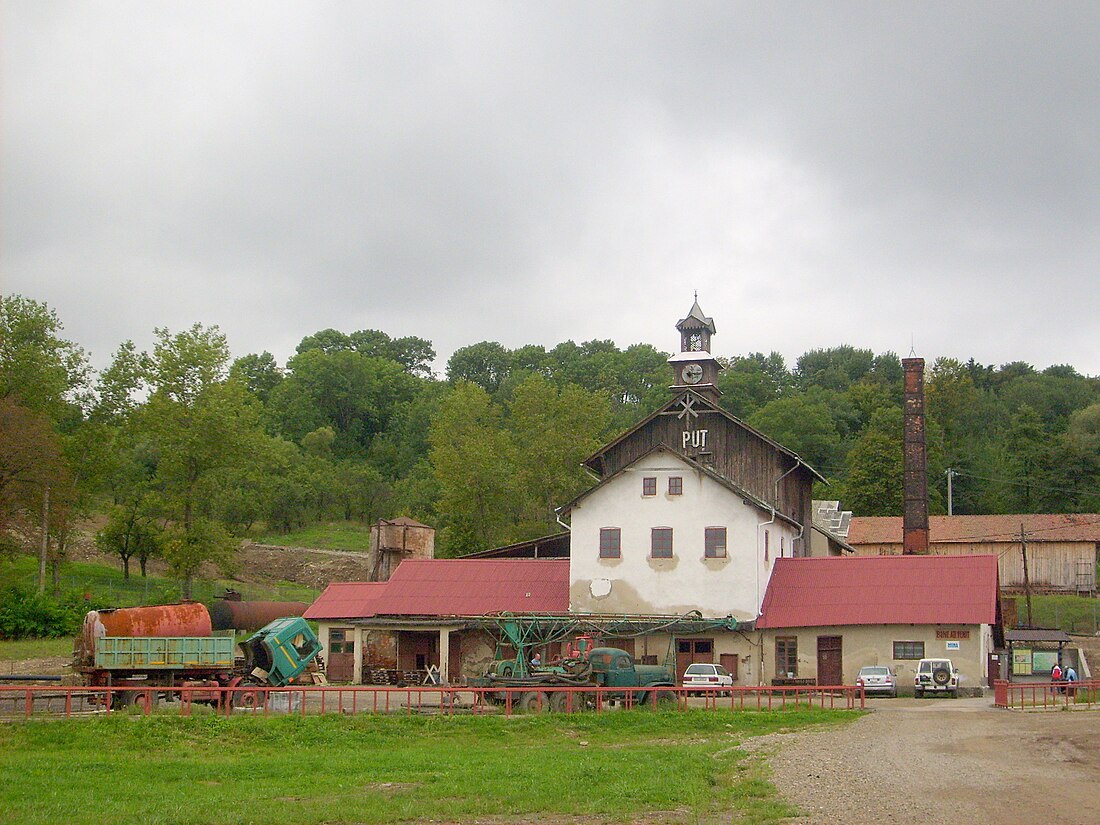Cacica
Commune in Suceava, Romania From Wikipedia, the free encyclopedia
Cacica (Polish: Kaczyka, German: Kaczika) is a commune in Suceava County, in the historical region of Bukovina, northeastern Romania. The commune is located in the central part of the county, 17 km (11 mi) from the town of Gura Humorului, 34 km (21 mi) from the city of Rădăuți, and 28 km (17 mi) from the county seat, Suceava. At the 2011 census, 74.8% of inhabitants were Romanians, 20.2% Poles, and 4.4% Ukrainians. Its Polish inhabitants are descended from settlers who arrived there at the turn of the 19th century during the Habsburg period.
Cacica
Kaczyka | |
|---|---|
 The salt mine in Cacica (September 2007) | |
 Location in Suceava County | |
| Coordinates: 47°38′N 25°54′E | |
| Country | Romania |
| County | Suceava |
| Government | |
| • Mayor (2020–2024) | Petru Tudosi[1] (PNL) |
Area | 57 km2 (22 sq mi) |
| Elevation | 385 m (1,263 ft) |
| Population (2021-12-01)[2] | 3,963 |
| • Density | 70/km2 (180/sq mi) |
| Time zone | EET/EEST (UTC+2/+3) |
| Vehicle reg. | SV |
| Website | www |
Administration and local politics
Commune council
The commune's current local council has the following political composition, according to the results of the 2020 Romanian local elections:[3]
| Party | Seats | Current Council | |||||||
|---|---|---|---|---|---|---|---|---|---|
| National Liberal Party (PNL) | 7 | ||||||||
| Social Democratic Party (PSD) | 4 | ||||||||
| Union of Poles of Romania (UPR) | 2 | ||||||||
Villages
The commune is composed of five villages: namely Cacica, Maidan, Pârteștii de Sus (the commune center), Runcu, and Solonețu Nou.
Solonețu Nou

Solonețu Nou (Polish: Nowy Sołoniec) is one of the Polish villages in Suceava County, in the historical region of Bukovina, northeastern Romania. It was established in 1834 by 30 Polish families in the Soloneț river valley.
A Polish school was founded in the village in 1870. 523 people from the village were deported to Poland after 1945 and the school was closed. Some Poles settled in Złotnik, Poland.[4] After the Romanian Revolution of 1989, the Polish school was reopened. In 1995 there were 718 inhabitants in the village. The Polish community from Solonețu Nou (together with those of Solca, Pleșa, Racova, and Arbore) has 365 families with 1046 Roman Catholics of Polish ethnicity.
Natives
- Valeriu Alaci (1884–1955), Romanian mathematician
- Ghervazen Longher (born 1972), Polish-Romanian politician
Gallery
- Roman Catholic chapel dedicated to Saint Barbara, located in the salt mine
- Roman Catholic Polish basilica in Cacica
- Roman Catholic church in Solonețu Nou
- Greek Catholic church in Cacica
- Orthodox church in Cacica
- Cacica kindergarten
- Cacica elementary school
- Panoramic view over Cacica, with the Orthodox church in the background
- Panoramic view over Cacica, with the Roman Catholic basilica seen in the background
- Solonețu Nou (Polish: Nowy Sołoniec) village, with the local Roman Catholic church seen in the background
- Rural landscape from Solonețu Nou (2018)
- Solonețu Nou (2018)
See also
References
External links
Wikiwand - on
Seamless Wikipedia browsing. On steroids.














